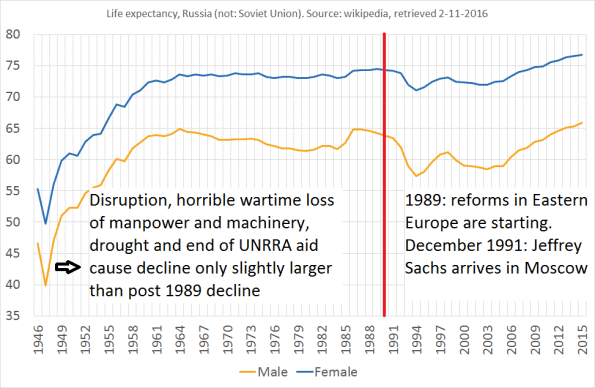For a kind of prediction of the 1947 mortality crisis you will find a march 1947 article by Ernest Germain published by the fourth international here (I love the internet). Basically, the exhaustion of war time stocks (during the war partly provided by the 1943 United Nations Relief and Rehabiliation Administration), the horrible losses of people manpower suffered during the war, the dislocation and loss of production capacity caused by the war and a terrible drought in 1946 caused a subsistence crisis in 1947. Jeffrey Sachs defends his neoliberal shock therapy policies (albeit with debt reduction), which he describes here, in this piece. Chinese gradualism of course led to superior results compared with the Big Bang shock policies which Sachs defends – but at this time China was not crumbling as a state.
Topics:
Merijn T. Knibbe considers the following as important: Uncategorized
This could be interesting, too:
tom writes The Ukraine war and Europe’s deepening march of folly
Stavros Mavroudeas writes CfP of Marxist Macroeconomic Modelling workgroup – 18th WAPE Forum, Istanbul August 6-8, 2025
Lars Pålsson Syll writes The pretence-of-knowledge syndrome
Dean Baker writes Crypto and Donald Trump’s strategic baseball card reserve

For a kind of prediction of the 1947 mortality crisis you will find a march 1947 article by Ernest Germain published by the fourth international here (I love the internet). Basically, the exhaustion of war time stocks (during the war partly provided by the 1943 United Nations Relief and Rehabiliation Administration), the horrible losses of people manpower suffered during the war, the dislocation and loss of production capacity caused by the war and a terrible drought in 1946 caused a subsistence crisis in 1947. Jeffrey Sachs defends his neoliberal shock therapy policies (albeit with debt reduction), which he describes here, in this piece. Chinese gradualism of course led to superior results compared with the Big Bang shock policies which Sachs defends – but at this time China was not crumbling as a state.
